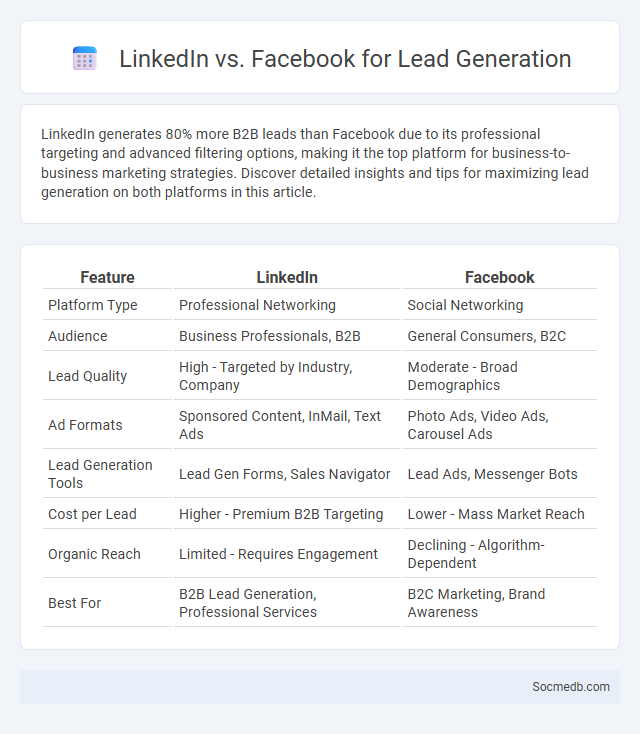
Photo illustration: LinkedIn vs Facebook for Lead Generation
LinkedIn generates 80% more B2B leads than Facebook due to its professional targeting and advanced filtering options, making it the top platform for business-to-business marketing strategies. Discover detailed insights and tips for maximizing lead generation on both platforms in this article.
Table of Comparison
| Feature | ||
|---|---|---|
| Platform Type | Professional Networking | Social Networking |
| Audience | Business Professionals, B2B | General Consumers, B2C |
| Lead Quality | High - Targeted by Industry, Company | Moderate - Broad Demographics |
| Ad Formats | Sponsored Content, InMail, Text Ads | Photo Ads, Video Ads, Carousel Ads |
| Lead Generation Tools | Lead Gen Forms, Sales Navigator | Lead Ads, Messenger Bots |
| Cost per Lead | Higher - Premium B2B Targeting | Lower - Mass Market Reach |
| Organic Reach | Limited - Requires Engagement | Declining - Algorithm-Dependent |
| Best For | B2B Lead Generation, Professional Services | B2C Marketing, Brand Awareness |
Introduction to Lead Generation: An Overview
Lead generation on social media involves attracting and converting potential customers through targeted content and engagement strategies. Your business can leverage platforms like Facebook, LinkedIn, and Instagram to capture high-quality leads by using tools such as lead magnets, optimized ads, and interactive posts. Understanding audience behavior and analytics allows you to refine campaigns for better conversion rates and stronger customer relationships.
Understanding LinkedIn for Lead Generation
LinkedIn serves as a powerful platform for lead generation by connecting professionals and businesses within targeted industries. Your profile and content should be optimized with relevant keywords to increase visibility among potential clients and partners. Engaging actively through personalized messages, groups, and posts enhances trust and improves the chances of converting connections into qualified leads.
Exploring Facebook as a Lead Generation Platform
Facebook offers powerful lead generation tools designed to help businesses reach targeted audiences effectively. Utilizing Facebook Ads and Lead Ads enables you to capture potential customer information directly within the platform, increasing conversion rates. Optimizing your Facebook page and engaging content enhances visibility and drives qualified leads for your business growth.
Key Differences Between LinkedIn and Facebook Leads
LinkedIn leads are primarily driven by professional networking, targeting decision-makers and B2B audiences with detailed job titles, industries, and company sizes, which makes them ideal for high-quality, business-focused conversions. Facebook leads rely on extensive user demographics, interests, and behaviors, making them suitable for broad consumer targeting across various age groups and interests with lower cost-per-lead metrics. The key difference lies in LinkedIn's emphasis on professional data accuracy versus Facebook's strength in diverse, large-scale consumer reach.
Target Audience: LinkedIn vs Facebook Lead Generation
LinkedIn excels in lead generation for B2B targeting professionals, decision-makers, and industry-specific groups, offering advanced filters for job titles, industries, and company sizes to optimize campaign precision. Facebook provides broad audience reach suitable for B2C lead generation, leveraging detailed demographic, interest, and behavioral targeting to engage diverse consumer segments effectively. Understanding platform-specific user behaviors and targeting options enhances lead quality and conversion rates across these distinct social media channels.
Lead Generation Strategies on LinkedIn
LinkedIn offers powerful lead generation strategies by leveraging targeted outreach and personalized content tailored to your industry and audience. Optimizing your profile with relevant keywords and engaging in LinkedIn Groups increases visibility, while utilizing LinkedIn Sales Navigator enables precise prospecting and relationship-building. Implementing a consistent posting schedule with valuable insights fosters trust and positions you as an authority, driving higher-quality leads to your business.
Effective Lead Generation Tactics on Facebook
Harness Facebook's advanced targeting features by creating custom audiences based on user behavior, demographics, and interests to boost your lead quality. Utilizing lead ads with compelling calls-to-action and minimal form fields ensures higher conversion rates by simplifying the user experience. You can maximize engagement and generate valuable leads by integrating retargeting campaigns that reconnect with users who have previously interacted with your content.
LinkedIn vs Facebook: Lead Quality and Conversion Rates
LinkedIn generates higher lead quality compared to Facebook due to its professional user base, making it ideal for B2B marketing and targeted outreach. Conversion rates on LinkedIn often surpass those on Facebook because users are more engaged in professional decision-making and networking. By leveraging LinkedIn's advanced targeting options, you can significantly improve your lead conversion and overall ROI.
Cost Comparison: LinkedIn vs Facebook Lead Generation
LinkedIn lead generation typically incurs higher costs due to its professional targeting capabilities, with average cost-per-lead ranging from $30 to $100, while Facebook offers more affordable options often between $5 and $20 per lead. LinkedIn's advanced targeting for B2B audiences yields higher quality leads but requires bigger budgets compared to Facebook's extensive reach and diverse demographic targeting suitable for B2C campaigns. Businesses aiming for precise professional engagement usually prefer LinkedIn despite the cost, whereas those focused on volume and cost-efficiency lean toward Facebook lead generation.
Choosing the Right Platform for Your Lead Generation Goals
Selecting the right social media platform significantly impacts lead generation effectiveness by aligning with audience demographics and engagement behaviors. LinkedIn excels for B2B lead generation due to its professional user base, while Facebook and Instagram offer robust targeting for B2C campaigns through advanced ad tools and large active communities. Analyzing platform-specific metrics and audience insights ensures optimized resource allocation and higher conversion rates.
 socmedb.com
socmedb.com